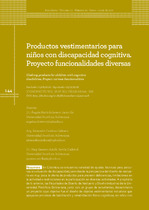| dc.contributor.author | Echeverri Jaramillo, Ángela María | |
| dc.contributor.author | Cardona Galeano, Alexander | |
| dc.contributor.author | Sevilla Cadavid, Gustavo Adolfo | |
| dc.coverage.spatial | Seccional Medellín | spa |
| dc.date.accessioned | 2021-01-22T19:02:58Z | |
| dc.date.available | 2021-01-22T19:02:58Z | |
| dc.date.issued | 2017 | |
| dc.identifier.uri | http://hdl.handle.net/20.500.11912/7560 | |
| dc.description | p. 144 - 159 | spa |
| dc.description.abstract | En Colombia se encuentra variedad de ayudas técnicas para personas en situación de discapacidad, pero desde la perspectiva del diseño de vestuario es muy poca la oferta de productos para prevenir deficiencias, limitaciones en la actividad o restricciones en la participación en diversas actividades. A propósito de lo anterior, las Facultades de Diseño de Vestuario y Diseño Industrial de la Universidad Pontificia Bolivariana, junto con un grupo de estudiantes, desarrollaron un proyecto cuyo objetivo fue el diseño de objetos vestimentarios inclusivos que apoyaran procesos de habilitación y rehabilitación físico-cognitivas, en niños con insuficiencia motora de origen cerebral, pertenecientes a la Fundación Lupines, en la ciudad de Medellín. En el marco del proyecto se diseñaron cuatro prototipos funcionales, que por su versatilidad en función de sus posibilidades de fabricación, con procesos de baja tecnología y materiales de bajo costo, permitió apoyar procesos de aprendizaje de gateo, marcha, motricidad fina y patrón cruzado; conocimientos importantes, ya que les permitirán a los niños alcanzar grados altos de autonomía. Para el desarrollo del proyecto se utilizó una combinación de enfoques de diseño universal y Diseño Centrado en el Usuario (DCU), que propone en primera instancia determinar el perfil del usuario y establecer sus características anatómicas, biomecánicas, antropométricas, cognitivas y socioculturales. Una vez hecho esto, se estableció un trabajo interdisciplinario con los profesionales de las áreas de fisioterapia, trabajo social y educadoras especiales de la Fundación Lupines, para validar los avances en los proyectos. Durante este proceso se desarrollaron pruebas de validación funcional, usabilidad y seguridad. Con el resultado se logró impactar positivamente la calidad de vida de un grupo de niños que no contaban con productos diseñados específicamente para el apoyo a los programas de desarrollo, basado en la integralidad del niño en área física. | spa |
| dc.description.abstract | In Colombia there is variety of technical aids for persons in situation of disability, but from the perspective of costume design the offer of products to prevent deficiencies, activity limitations or restrictions in the participation in various activities is very little. Following from the above, the faculties of Costume design and Industrial design at Universidad Pontificia Bolivariana, together with a group of students, developed a project whose objective was the design of inclusive dress objects that support physical-cognitive habilitation and rehabilitation processes in children with cerebral motor failure, belonging to the Lupines Foundation, in the city of Medellin. In the framework of the project, four functional prototypes were designed. These permitted to support learning processes such as crawling, running, fine motricity and cross pattern thanks to their versatility in accordance with their manufacturing possibilities, low-technology processes and low-cost materials. This is important knowledge, since the prototypes will allow children to reach high degrees of autonomy. A combination of approaches of universal design as well as UserCentered Design (UCD) were used for the development of the project. In first place, it is proposed to determine the profile of the user as well as their anatomical, biomechanical, anthropometric, cognitive and socio-cultural characteristics. After this, an interdisciplinary work with professionals in the areas of physiotherapy, social work and special educators of the Lupines Foundation was established in order to validate the progress in the projects. Functional validation, usability and safety tests were developed during this process. The result had a positive impact in the quality of life of a group of children who did not have products specifically designed to support development programs, based on the integrity of the child in physical space. | spa |
| dc.format.mimetype | application/pdf | |
| dc.language.iso | spa | |
| dc.publisher | Universidad Pontificia Bolivariana | spa |
| dc.relation.ispartof | Iconofacto | spa |
| dc.rights | Attribution-NonCommercial-NoDerivatives 4.0 International | * |
| dc.rights.uri | http://creativecommons.org/licenses/by-nc-nd/4.0/ | * |
| dc.subject | Diseño inclusivo | spa |
| dc.subject | Producto vestimentario | spa |
| dc.subject | Inclusión social | spa |
| dc.subject | Inclusive design | spa |
| dc.subject | Clothing product | spa |
| dc.subject | Social inclusion | spa |
| dc.title | Productos vestimentarios para niños con discapacidad cognitiva. Proyecto funcionalidades diversas | spa |
| dc.title.alternative | Clothing products for children with cognitive disabilities. Project: various functionalities | spa |
| dc.type | article | spa |
| dc.rights.accessRights | openAccess | spa |
| dc.type.hasVersion | publishedVersion | spa |
| dc.description.sectional | Medellín | spa |
| dc.identifier.instname | instname:Universidad Pontificia Bolivariana | spa |
| dc.identifier.reponame | reponame:Repositorio Institucional de la Universidad Pontificia Bolivariana | spa |
| dc.identifier.repourl | repourl:https://repository.unab.edu.co/ | |


